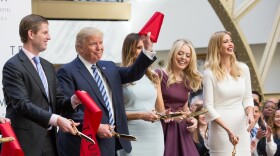
Marilyn Geewax
Marilyn Geewax is a contributor to NPR.
Before leaving NPR, she served as senior business news editor, assigning and editing stories for radio. In that role she also wrote and edited for the NPR web site, and regularly discussed economic issues on the mid-day show Here & Now from NPR and WBUR. Following the 2016 presidential election, she coordinated coverage of the Trump family business interests.
Before joining NPR in 2008, Geewax served as the national economics correspondent for Cox Newspapers' Washington Bureau. Before that, she worked at Cox's flagship paper, the Atlanta Journal-Constitution, first as a business reporter and then as a columnist and editorial board member. She got her start as a business reporter for the Akron Beacon Journal.
Over the years, she has filed news stories from China, Japan, South Africa, and Europe. She helped edit coverage for NPR that won the Edward R. Murrow Award and Heywood Broun Award.
Geewax was a Nieman Fellow at Harvard, where she studied economics and international relations. She earned a master's degree at Georgetown University, focusing on international economic affairs, and has a bachelor's degree from The Ohio State University.
She is the former vice chair of the National Press Club's Board of Governors, and currently serves on the board of the Society of American Business Editors and Writers.
-
Marilyn Geewax, who recently retired as an NPR business editor, returned to Ohio for her class's 45th reunion. The visit showed how things changed dramatically for retirees in just one generation.
-
-
President Donald Trump's refugee ban in the Middle East could be one of the first conflicts of interest for the president, as his bans avoided nations that he has business ties in.
-
President-elect Trump has interests in hundreds of businesses. Many government agencies and policies could affect his profits. Here's a look at some of his businesses, and the possible conflicts.
-
-
-
Many business books try to help you get rich quick. But three of 2014's biggest sellers focused on unfairness and inequality. Economists say expect more: Books on inequality are riding a huge wave.
-
In December 1993, President Clinton signed the North American Free Trade Agreement into law. Presidential candidate Ross Perot predicted Americans would hear a "giant sucking sound" as Mexico vacuumed up U.S. jobs. Economists say that the worst of Perot's fears never materialized. But opponents still see downsides.
-
The federal shutdown had economists worried, but consumers have had something to smile about. Gasoline prices are the lowest in three years — under $3 a gallon in some places. Analysts credit greater supplies, lower demand, the easing of Middle East tensions and even a slow hurricane season.
-
With the oil and gas sectors booming, the need for truckers is growing. But the ranks of well-trained drivers are shrinking, especially as baby boomers hit retirement age. And competition for drivers has become fierce, with the annual turnover rate nearing 100 percent.







